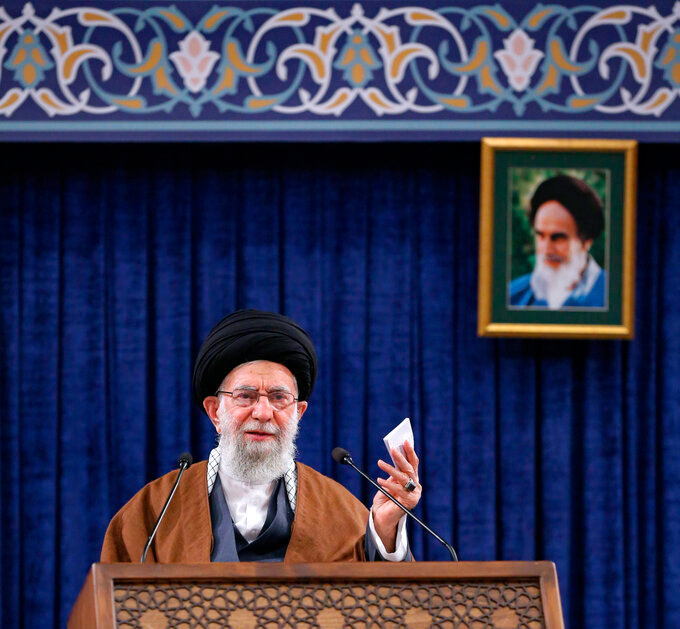excalibur
Diamond Member
- Mar 19, 2015
- 22,752
- 44,311
- 2,290
The miserable Biden era will leave a mess behind, a mess, unlike any POTUS ever left behind. If we're still here to discuss it.
Shaping up as an even larger capitulation than the articles of appeasement struck with Iran in 2015, the Biden administration could sign in Vienna as early as Monday a new deal with the ayatollahs that would include a staggering hostage ransom sum totaling as much as 25 percent of Tehran’s entire annual budget.
Several sources in Washington say that the Vienna talks between six top world powers and Iran could conclude as early as Monday. Washington officials caution that “nothing is agreed until everything is agreed,” but Iran watchers note that Nuwruz, the 13-day New Year holiday in Persia, starts March 20. Because adherents don’t work during Nuwruz, the window to conclude a deal is short.
Ironically, despite the tough anti-Kremlin talk in Washington, the Russian ambassador in Vienna, Mikhail Ulyanov, is a key player in the attempt to renew the Joint Comprehensive Plan of Action, out of which President Trump took America. The Biden administration is said to be as eager for a quick handshake as the Iranians, who are allied with Moscow. The administration also is said to be hoping any congressional pushback would weaken as the Ukraine crisis rages on.
Reuters reported recently that President Biden’s envoy to the talks, Robert Malley, offered to unfreeze $7 billion from Iranian funds held in South Korean banks in exchange for the release of four Americans held in Iran. Sources tell the Sun that similar frozen accounts in Japan, Iraq, and China would be added to the pot, raising the ante to as much as $11 billion. That works out to more than $2.5 billion a hostage.
Iran’s annual budget is estimated at $40 billion.
A former American hostage in Iran, Xiyue Wang, warns that such a deal would encourage more undue imprisonments in Iran. Washington has imposed “not a single sanction” in connection with Iran’s frequent hostage-taking, Mr. Wang told the Sun, “so they have no reason to stop it. Keeping people in prison costs them nothing.”
In summer 2016 Mr. Wang was arrested on unsubstantiated espionage charges while researching Persian history as he worked toward his Ph.D. from Princeton. A year later, while in Iran’s dungeons, he was sentenced for 10 years in prison. “When I was arrested I hoped President Obama would be able to release me,” Mr. Wang said. In 2018, when President Trump exited the Iran deal, Mr. Wang knew his release would take longer than he anticipated, which it did. In December 2019, he was finally freed in an exchange for one Iranian held in America. No money changed hands.
...

 www.nysun.com
www.nysun.com
Shaping up as an even larger capitulation than the articles of appeasement struck with Iran in 2015, the Biden administration could sign in Vienna as early as Monday a new deal with the ayatollahs that would include a staggering hostage ransom sum totaling as much as 25 percent of Tehran’s entire annual budget.
Several sources in Washington say that the Vienna talks between six top world powers and Iran could conclude as early as Monday. Washington officials caution that “nothing is agreed until everything is agreed,” but Iran watchers note that Nuwruz, the 13-day New Year holiday in Persia, starts March 20. Because adherents don’t work during Nuwruz, the window to conclude a deal is short.
Ironically, despite the tough anti-Kremlin talk in Washington, the Russian ambassador in Vienna, Mikhail Ulyanov, is a key player in the attempt to renew the Joint Comprehensive Plan of Action, out of which President Trump took America. The Biden administration is said to be as eager for a quick handshake as the Iranians, who are allied with Moscow. The administration also is said to be hoping any congressional pushback would weaken as the Ukraine crisis rages on.
Reuters reported recently that President Biden’s envoy to the talks, Robert Malley, offered to unfreeze $7 billion from Iranian funds held in South Korean banks in exchange for the release of four Americans held in Iran. Sources tell the Sun that similar frozen accounts in Japan, Iraq, and China would be added to the pot, raising the ante to as much as $11 billion. That works out to more than $2.5 billion a hostage.
Iran’s annual budget is estimated at $40 billion.
A former American hostage in Iran, Xiyue Wang, warns that such a deal would encourage more undue imprisonments in Iran. Washington has imposed “not a single sanction” in connection with Iran’s frequent hostage-taking, Mr. Wang told the Sun, “so they have no reason to stop it. Keeping people in prison costs them nothing.”
In summer 2016 Mr. Wang was arrested on unsubstantiated espionage charges while researching Persian history as he worked toward his Ph.D. from Princeton. A year later, while in Iran’s dungeons, he was sentenced for 10 years in prison. “When I was arrested I hoped President Obama would be able to release me,” Mr. Wang said. In 2018, when President Trump exited the Iran deal, Mr. Wang knew his release would take longer than he anticipated, which it did. In December 2019, he was finally freed in an exchange for one Iranian held in America. No money changed hands.
...

To Re-Enter Iran Deal, Biden Is Preparing To Pay Up to $11 Billion in Ransom for Four Hostages
A new deal with the ayatollahs would include a staggering hostage ransom sum totaling as much as 25 percent of Tehran’s entire annual budget.